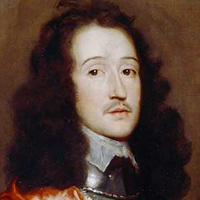To Althea, From Prison by Richard Lovelace: Summary and Analysis
'To Althea, From Prison' is written by Richard Lovelace in 1642. This is his one of the best known romantic poems which is especially famous for its final stanza's first line; 'Stone walls do not a prison make, Nor iron bars a cage.'

Richard Lovelace (1617-1657)
Lovelace was demanding the restoration of the king in the throne of England and for that demand, he was imprisoned. He wrote this poem from within the prison, appreciating the monarch. He has written to his beloved from the prison. As he was a cavalier poet, he strongly supported the monarchy.
This beautiful poem deals with the paradoxical theme of freedom in the prison. In the first stanza, he compares his liberty with that of god’s above and birds in the sky and finds himself to enjoy more than them. When his beloved comes to the gate and when he plays with her hair, he forgets that he is in prison. He forgets the political situation and becomes one with his beloved. He enjoys the blissful moments brought by the presence of his beloved. His beloved comes there with pure wine for him and when the two sip the pure wine with the loyal flames in the heart he enjoys the liberty, not even comparable to the fish swimming in the deep. To some extent, the reference of the pure wine and swimming may have sexual implication.
After his beloved is gone, he sings of the sweetness, mercy, majesty and the glories of his king and forgets that he was caged. He was imprisoned, but enjoys the liberty like that of the winds. He finds liberty in the appreciation and the praise of his king. In this respect he appears as a royalist.
Finally, he regards the prison as the hermitage in the condition that both soul and mind remain free. He wants to give the free soul to his beloved and free mind to his king. If he is given that freedom, he enjoys the freedom comparable to the angels.
The poet addresses Althea in the poem, but her identity is not disclosed. Some critics are of the view that she may be the fictional character born out of Lovelace’s imagination during his imprisonment. Some others argued that she may be a woman called Lucy Sacheverell. The allusions to birds, fish and winds in the poem refers to the speaker’s strong desire for the freedom. The speaker feels a kind of metaphysical ecstasy when the two souls join together in God leaving their human body. This divinely freedom can only be experienced through love.
